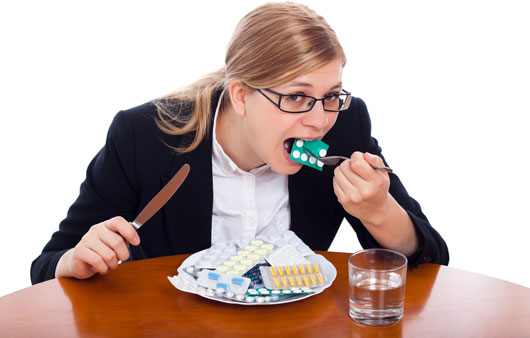'Heavenly' facts about antibiotics
A leading microbiologist claims, the amount of antibiotics we absorb from meat and dairy products may be the cause of the mysterious appearance of a number of modern epidemics, such as Childhood diabetes, asthma, food allergies, autism, eczema or obesity.
Until now, the main concern about antibiotics is that their abuse in modern medicine is creating dangerous strains of drug-resistant bacteria. According to the World Health Organization's statistics in 2011, 25,000 people die each year in Europe alone due to infections caused by antibiotic-resistant bacteria.
However, this is not the only worry about antibiotics. According to the leading American bacteriologist, Dr. Martin Blaser, there is growing evidence of antibiotic that makes people fat.
Antibiotics increase chlorine absorption, 'fattening' people
In his newly published book, Blaser said, after the Second World War, agricultural researchers conducted a study to find out whether streptomycin could reduce mortality rates in Chicken kept or not.
When the new 1-day-old chicks used high doses of this new antibiotic, they discovered in astonishment that they had created a new 'super chicken' line. These chicks not only get rid of the diseases that often attack them, but in 4 weeks they are twice as big as those of the same age that are not allowed to take streptomycin.

In addition to direct drinking, antibiotics are silently penetrating our bodies through residual residues in processed foods from meat, eggs and milk of livestock.(Artwork: Alamy)
At that time, it was unclear why new antibiotics, which were made to fight bacteria, had such an effect, but no one stopped to study. The breakthrough was quickly adopted by the livestock industry around the world to increase productivity.
However, now, nearly 70 years later, there is growing evidence that the meat antibiotics that we eat are 'fattening' us up like cattle, pigs, chickens and sheep are forced to use drugs to gain weight, benefit farms. These types of drugs can even be the cause of a big pandemic that is sweeping developed countries.
One of the first tests to take place in 1951 revealed, 10 premature babies in Italy, who were given chlortetracycline antibiotics daily were 8% heavier than those who didn't.
In a long study from 1991 to 2006, Dr. Blaser and colleagues tracked the health status of 14,500 women and their children. Experts found that taking children to use antibiotics in the first 6 months of life was also fatier than the other group.
Mr. Blaser explained, each of us is home to a 'microbial community' that brings together more than 100 trillion 'friendly' microorganisms with a total weight of up to 2kg. Antibiotics can alter the complex balance of the environment inside the body, leading to a change in how the body processes sugar and fat, making us absorb more calories.
Antibiotics silently invade the human body from food
The concern is that, according to Dr. Blaser, not only are people using them directly, antibiotics are silently entering our bodies through food and drinks.
A study published last year in Frontiers in Public Health confirms that the rapid increase in obesity in the United States in the past 20 years has actually stems in part from a large number of people with long-term exposure. Small antibiotics have infiltrated their food chain during the same time.
Experts say, when animals are given antibiotics, some of these drugs may still exist in products made from their bodies, such as meat, eggs, milk, . and go into meals. of each household.
For example, meat and milk in the US and Europe may be allowed to contain up to 100 micrograms of tetracycline (a broad-spectrum antibiotic for humans) in every kilogram of food.'This means that a child who drinks two cups of milk a day will consume about 50 micrograms a day, day in and day out,' said Blaser.
And long-term antibiotic accumulation is thought to have serious effects on the microorganisms within our bodies, leading to changes that could potentially cause illness, as well as exacerbate. The emergence of antibiotic resistant strains of bacteria.
- What are antibiotics and classify antibiotics
- Find new antibiotics under the ocean
- Why do you know that antibiotics do not treat flu, many people continue to abuse?
- Antibiotics from dirt
- Bad habits of parents hurt the liver and kidneys, endanger children
- 7 mistakes we often make when talking about antibiotics
- Understand disease to use antibiotics correctly
- Find a new drug that can replace antibiotics
- When do you need to say 'no' to antibiotics?
- Children under 2 years of age use many antibiotics prone to obesity
- The world is depleted of new generation antibiotics
- Risk from fluoroquinolones
 Green tea cleans teeth better than mouthwash?
Green tea cleans teeth better than mouthwash? Death kiss: This is why you should not let anyone kiss your baby's lips
Death kiss: This is why you should not let anyone kiss your baby's lips What is salmonellosis?
What is salmonellosis? Caution should be exercised when using aloe vera through eating and drinking
Caution should be exercised when using aloe vera through eating and drinking